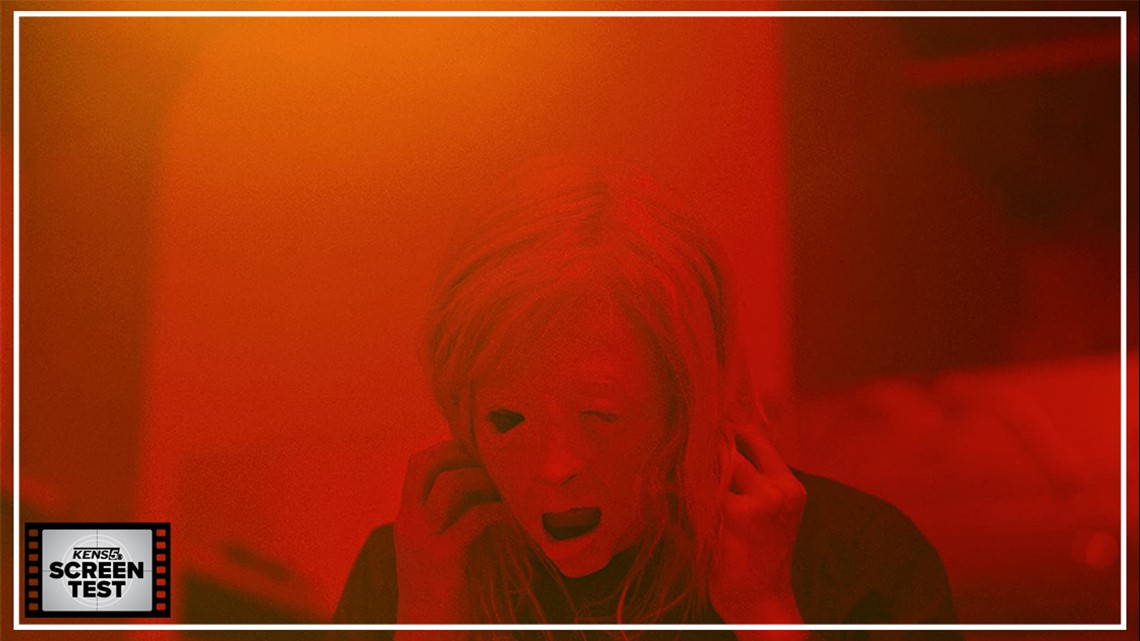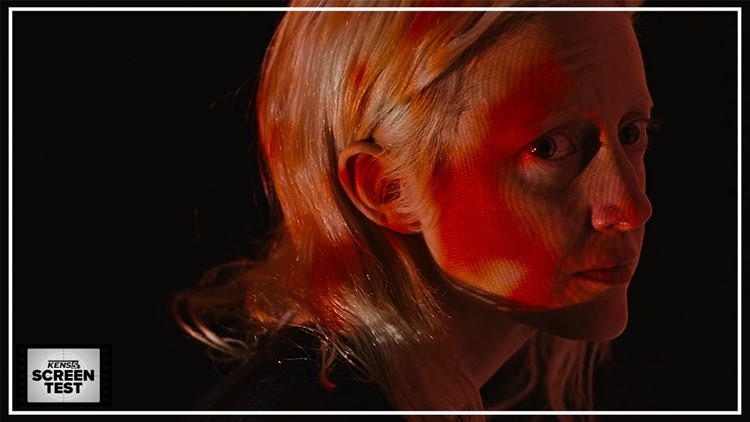[[Note: When "Possessor" opens, it will largely screen at indoor movie theaters during the ongoing coronavirus pandemic. While the purpose of this review goes deeper than binary recommendation to discuss the film's merits as an artistic work in context of its time, we encourage our readers to continue exercising the latest safety guidelines from health authorities and consider them if and when you may decide to visit the cinema to watch this movie.]]
The name of writer-director Brandon Cronenberg’s blood-splattered second feature is “Possessor,” which might as well be what we also call the subgenre of mind-invasion head trips that the film probably considers itself an entry of, and a commentary on. When Tasya Vos (Andrea Riseborough) is hired by a high-paying client to invade someone else’s psyche, we can imagine Christopher Nolan nodding his approval. When she breathes through someone else’s mouth and looks through their eyes, we’re reminded of Spike Jonze’s “Being John Malkovich.” And when she cries for her allies to “Pull me out!”, we get Wachowskian reminders of Neo stuck in a simulation; their physical selves are ostensibly safe, but minds have splintered. So too, perhaps, have souls.
“Possessor” – a horror thriller that unfolds like a slow burn across an oil field – is a more confident, beguiling and brutal picture than Cronenberg’s confident, beguiling, brutal 2012 debut, though also more of a head-scratcher (admirers of gore and aesthetically hypnotic cinema will enjoy the itch the most, even as it starts to splice your head open). In “Antiviral,” Cronenberg’s first movie, celebrity mania has become so overcharged that people are willing to have themselves injected with diseases that have afflicted those in the tabloids. In “Possessor,” things are more covert, with Cronenberg’s screenplay placing a sharper focus on character than the dystopian world-building of his last effort.
Then again, we come to suspect that in learning about Tasya, we also learn about the coldly photographed world of industry around her. She works as an operative of sorts for a shadow organization that carries out assassination attempts of the most cerebral kind: Collaborating with her handler, Girder (Jennifer Jason Leigh), Tasya uses a Space Jockey-esque helmet that allows her to take over the bodies of others – a visual sequence so wildly imaginative and dizzyingly realized that it’s like visiting Bodies: The Exhibition on hallucinogens – to carry out her orders. Since she’s wearing someone else’s skin, targets are easily accessible, and no one suspects it’s her. Eat your heart out, Ethan Hunt.
The film is patient to explain all this, and its opening sequence of a grisly stabbing in broad daylight isn’t revealed to be Tasya’s doing until she “wakes up” in a dark bunker upon completing her objectives (which comes when the Black woman she’s possessing is decimated in a barrage of police gunfire; the image resonates for obvious reasons). As Tasya prepares for her next assignment – taking out a company executive while masquerading as his daughter’s boyfriend, Colin (Christopher Abbott) – we slowly but surely are gifted clarity about the proceduralism of the opening scenes, including how Tasya inserting a needle into her hijackee’s cranium and turning the dial on some gadget to induce pain is a “recalibration” of her control.
But something haunts Tasya, who the reliable Riseborough plays with an emptiness that feels tragically deeper than the steeliness of a Hunt or James Bond. She rehearses lines not only in preparation for a new mission, but also upon returning to a splintered family that has no clue where she really goes when she leaves on long business trips. Her motivations are one of the movie’s many mysteries; why she does what she does doesn’t seem to stem from duty or financial prerogative, but perhaps predestination.
“You have a very special nature,” Girder assures her early on. Brace yourselves: That might be the flashiest hint we’re provided about Tasya’s background. But the ambiguity will be central for when “Possessor” begins to transcend its many influences and a busy screenplay down the line, stretching our capacity for the bizarre and bloody when Colin eventually starts to struggle against Tasya’s invasion against the backdrop of disintegrating reality and inherent questions of morality. Two souls begin fighting over room for only one, and they’re standing on the cliff’s edge.
At the same time, the voyeuristic foundations of cinema come to the fore in a story that only becomes more interesting when it sheds familiar psychoheist intrigue for subtly philosophical inquiries. Cronenberg struggles to maneuver around the awkwardly dissonant elements of its narrative – there’s very little warning when things go from basic suspense to maximum WTF-ery – but his dedication to creeping us out with melting bodies and screams caught in kaleidoscopic interdimensional (or interpersonal) spaces is to be admired. Well, right after we pick our jaws up from the floor and pop our eyeballs back in place, that is.
Aesthetically, meanwhile, the movie is more captivating than inviting, which is undoubtedly the intention. The sci-fi tangibles of “Possessor” are shot with perverse fascination by Karim Hussain, who returns the same near-erotic visual style that he employed in Cronenberg’s debut to get creepily intimate with plugs and sleek machinery and strange devices. With “Possessor,” the two have collaborated for an experience far more singular for its sensorial achievement than its screenplay specifics, placing haunting emphasis on a relationship between the mechanical and the organic that feels foundational to the movie’s ideas and stomach-churning carnage. As with “Antiviral,” steely objects – most of them pointy, sharpened or serrated – are carefully inserted or plunged with passionate abandon (there’s not really a middle ground) into human skin, and the sound team should be either damned or commended for ensuring we feel the jolt of those scenes even when we peer through our fingers.


The cinematic exploration of identity has yielded fascinating creations and conundrums, several of which have been referenced in this review. But the breakdown of it is usually horrifying to witness, and even more so when we consider what the questioning of the self in movies inherently means for us observing and questioning along with those on the screen. Watching certain images late in Colin and Tasya’s struggle for control in “Possessor” that can’t gracefully be described in words (the mark of a movie that demands to be seen firsthand, if anything), it becomes obvious that Cronenberg is enticed by the horror of it all. And Abbott is unnervingly poised to accomplish the tough task that’s handed to him of playing two figures fighting over the same husk.
But a part of Cronenberg, I suspect, is also interested in disentangling the sadness glimpsed in the flashes of violence—the exaggerated brutality resulting from total loss of what’s practical and what’s logical, the rules by which we think we live. What’s most surprising about “Possessor” – especially in the months after initial Sundance reactions largely highlighted its indulgence of bodily destruction – is its late-blooming empathy. Mind you, this isn’t an empathetic story; Cronenberg has no sympathy for whatever you eat two hours before watching “Possessor,” let alone the well-being of his characters. But the elemental disorientation of its chaotic climax highlights the film’s triumph—that the squeamishness of its violence is justified by the utter loss of Colin and Tasya’s recognition of themselves, even as we find ourselves struck more by the destruction than how that destruction ultimately affects our protagonists. In that regard, “Possessor” may be more successful as thesis in the cinematic canon about fractured identity and literal psychological invasion than original suggestion. But what a beguilingly envisioned thesis it is, crafted with elegant visual distortion and human agony lining its abstractions.
"Possessor" is not rated; it contains gore, blood and murder in abundance. The movie releases in select drive-in and indoor theaters Friday.
Starring: Andrea Riseborough, Christopher Abbott, Jennifer Jason Leigh, Rossif Sutherland
Directed by Brandon Cronenberg
2020
OTHER SCREEN TEST REVIEWS
- ‘Save Yourselves!’ Review: Aliens and millennial apathy come for Jack Reynolds and Sunita Mani in charming sci-fi-comedy
- ‘Ottolenghi and the Cakes of Versailles’ Review: Sumptuous ideas, sour presentation
- ‘Kajillionaire’ Review: Miranda July’s newest oddball drama is her most narratively triumphant
- ‘The Nest’ Review: Jude Law, Carrie Coon spiral toward marital oblivion
- ‘The Secrets We Keep’ Review: Noomi Rapace shines in shoddy morality play
- ‘The Devil All The Time’ Review: Tom Holland leads all-star cast in glum, aimless portrait of a tarnished America
- 'Buoyancy' Review: The cruelties of a corrupt fishing industry are spotlighted in one-dimensional story
- ‘The Social Dilemma’ Review: Another compelling, urgent argument for questioning what shows up in our Facebook feeds



